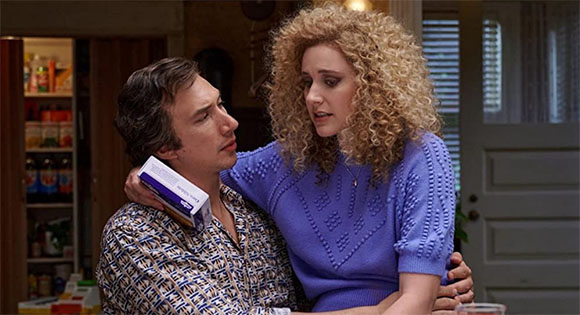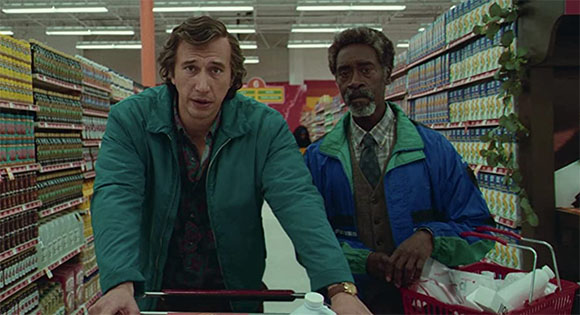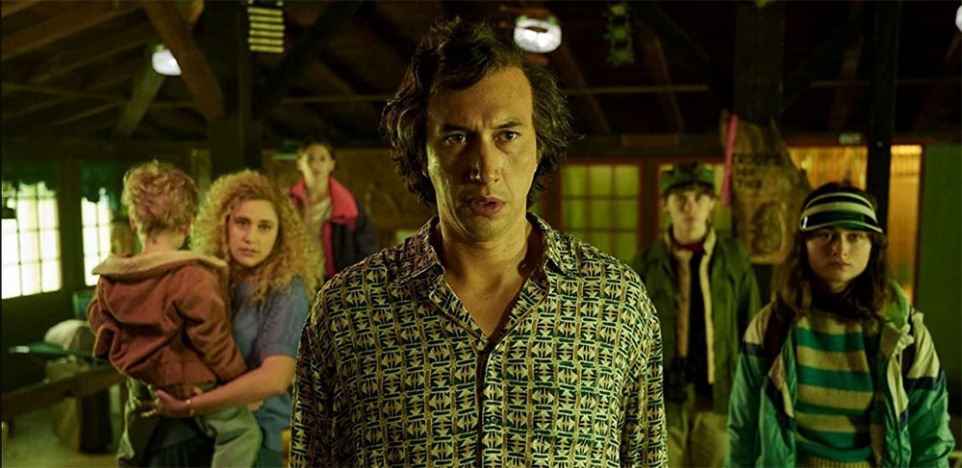“We are fragile creatures surrounded by hostile facts,” states Murray (Don Cheadle), who teaches popular culture at the College on the Hill in a small midwestern town. He shows his students things like the history of the movie car crash and believes Elvis Presley should be an academic field.
Two of the fragile creatures in his life are Jack (Adam Driver), his best friend and a pioneering professor of “Hitler Studies” at the college, and Jack’s wife Babette (Greta Gerwig), who teaches life skills to the elderly and infirm. They have four children, three from a previous marriage and their own toddler Wilder (Henry and Dean Moore). Heinrich (Sam Navoli) is talkative and inquisitive. Steffie (May Navoli) asks a lot of interesting questions. Denise (Raffey Cassidy) is concerned about her mother’s forgetfulness and thinks it might be due to some pills she is taking.
Jack and Murray are interested in the forces that are shaping family life, such as media, advertising, personal computers, and popular culture. Babette is worried about death; she admits to Jack, “I fear death more than I love you.” This leads to her involvement in an underground medical experiment.

Everything in these people’s lives gets turned upside down when a train crashes and sends toxic chemicals into the air. A huge dark cloud appears in the horizon and drifts toward their town. The authorities label it a “Airbourne Toxic Event” and order an evacuation. The family packs up their essentials and inch their way onto the jam-packed highway in their station wagon. When Jack steps out of the car, he is exposed to the deadly gas, and the family’s levels of fear and dread increase. They end up in a crowded shelter where one of the men complains that their plight is not getting enough media coverage.
Viewers will recognize the common elements of blockbuster disaster films: special effects, car crashes, long traffic jams, panicked crowds. But the director, Noah Baumbach stays focused on how, as is said at one point in the film, “family is the cradle of the world’s misinformation.” As we watch this family respond to the threat of death and their feelings after surviving, we are encouraged to explore consumerism in American society, the temptations and comforts of addiction, believing in each other instead of in heaven, and the impact of surprises on our lives. In one scene Murray reflects upon the primal role of television in our times:
“It’s like a myth being born right there in our living room. Like something we know in a dream-like and preconscious way. . . . TV offers incredible amounts of psychic data. . . . The medium practically overflows with sacred formulas If we can remember how to respond innocently and get past our irritation, weariness, and disgust.”

On the other hand, our everyday offers us opportunities to see things in new ways. Shopping in the grocery store after the disaster, Murray waxes poetic about what he feels in that environment:
“Do you know, the Tibetans believe there is a transitional state between death and rebirth. That’s what I think when I come here. The supermarket is a waiting place. It recharges us spiritually. It’s a gateway. Look how bright. Look how full of psychic data. Waves and radiation. . . . All the letters and numbers are here. All the colors of the spectrum, all the voices and sounds, all the code words and ceremonial phrases. We just have to know how to decipher it.”
White Noise, published in 1985, is Don DeLillo’ 8th novel. Time magazine listed the book in its Best English-language Novels from 1923 to 2005. It has been heralded widely as an example of postmodernism. Noah Baumbach’s unforgettable movie does the novel justice.
